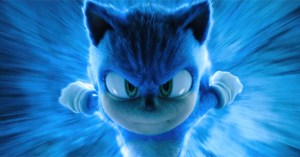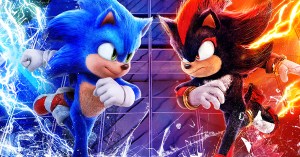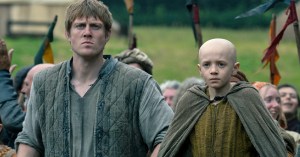Interview: Josh Hartnett talks 30 Days of Night
We talk vampires and night shoots with the actor.
 Josh Hartnett has had a busy career since his big-screen debut in Halloween H20 in 1998. With 30 Days of Night, out now in cinemas, he marks horror book-ends to his career, nine years of experience transforming him from a vulnerable son in Halloween to a bona-fide protector in 30 Days.
Josh Hartnett has had a busy career since his big-screen debut in Halloween H20 in 1998. With 30 Days of Night, out now in cinemas, he marks horror book-ends to his career, nine years of experience transforming him from a vulnerable son in Halloween to a bona-fide protector in 30 Days.
Along the way he’s played a variety of roles in films as diverse as Black Hawk Down, Sin City and The Black Dahlia. He’d prefer if you didn’t mention Pearl Harbor.
Rotten Tomatoes caught up with Hartnett to find out more about his career, and his time on the vampire flick.
It seems that you have a passion for horror movies; this is not your first one. The Faculty, Halloween…
Josh Hartnett: I’s say The Faculty is kind of a spoof. Out of the 23 films that I have done, only two of them are really horror movies. I wouldn’t say that it’s my genre but I would say that this film was something that I thought would be an interesting project. I’m not limited by genre and it doesn’t really matter what the genre is as long as the film is going to be new and have some real artistic integrity. This was a good group of people to work with.
We haven’t seen vampires like this on screen for a long time.
JH: Yeah, it kind of harkens back to the original concept of vampires, maybe more the silent area, the Nosferatu types, but more the Nosferatu that can actually move. It’s more about it’s more about these creatures being creatures and less about them being humanised.
I think vampires have gotten maybe a little bit silly in the last few years where they’re all wearing crushed velvet and reading poetry and making sweet love to their victims, you know, it’s not really all that scary.
First of all I liked the way that Ben Templesmith drew the vampires and I liked the way that David Slade kind of brought that to the screen. I think Danny Huston really flushes it out and makes it a fully-fledged character and half the reason that this film works because Danny plays Marlow.

Eben’s kind of an unlikely hero as well in the sense that he’s a good deal more reluctant than your usual vampire movie heroes.
JH: We made him more like that than he was in the comic book. We spent a little bit of time before we started filming, rewriting and trying to figure out how to adapt this. The type of film that this was for me was a Western with supernatural overtones. The character is, I think, more interesting when he is isolated so I wanted him emotionally isolated. We took the relationship he has in the comic book with his wife, where they’re kind of this dynamic duo and we separated them and then had that have a major effect on how he related to his younger brother.
So basically he is someone who is not letting a lot of people in when the movie starts and nor is he capable of relating to a lot of people. And, obviously, the physical isolation of being in the middle of nowhere in the Great North adds to that.
JH: There were 20 days of cold shooting and 33 days of night shoots. We shot the first bit of the film in a snow farm in Wanaka which is on the South Island of New Zealand. We were on top of a mountain a couple of hundred metres away from where the US snowboard team was practising
It was horribly cold and I actually had Mono at the time – I was sick as a dog – so that made it even more chilling. And then when we finished that we went up to Auckland where it was pretty warm and shot the rest of it on these sets that were built by an amazing set designer with fake snow and all that. But we shot a lot of nights up there; a lot of it was outdoors.
The night thing, we had about a month and a half where we never slept during the night and were never awake during the day which was a little unnerving after a while.

What was Danny Huston like to work with?
JH: Danny was a friend of mine before we even started so it was just fun to work with him. He’s a professional but he’s also a real gentlemen so there’s not a lot of method bullshit; just a lot of trying to figure out how to create the best image, how to create the best character, and I loved talking to him about that. There was a lot of communication, especially between him and David Slade, because really Danny and I are only in one scene together and it’s almost purely physical. That sounds weird! We just beat the crap out of each other!
Watching this you get the sense that your roles have matured. Back in the day you’d have been cast as your younger brother.
JH: Yeah! [laughs] I don’t know, I never really think of it that way, I just think of interesting roles to play. I guess that I have matured, I guess growing up and becoming a man, your taste in characters changes and I think I have become more interested in active characters as I have become less contemplative in my personal life. Things have become a little bit more interesting in the doing these days and less interesting in the thinking about the doing.
So you’re a lot more comfortable on a film set? That it’s not something you have to think a lot about anymore?
JH: No, not at all. I was talking about my personal life being less absorbed in the concepts of life and more interested in actually getting out and feeling it and being a part of it. I was a kind-of contemplative kid and I think the characters reflected that, a lot of them were ponderous and I think it’s been more fun now to find characters that are a little bit more outgoing. The character that I play next, in this film August that I produced as well – David Bowie was in it with me and Naomi Harris who is an excellent British actress – the character is just a real jerk, he’s starting to keep this company afloat just through sheer force of personality and he will sell anything to anybody if it will help save this precious golden egg that he thought he had created in this company. But I think that just your tastes change as you get older and I think they’ll continue to change.
As that happens, do you see yourself becoming more interested in the behind-the-camera roles?
JH: Control is always good, you know. Having a little bit more say and having a little bit more I guess depth of understanding in the process. Yeah I guess I will probably produce a little bit more. I’ve got a couple of scripts that I am producing right now that are still in the works and I have written a few things. I don’t know, we’ll see where it all ends up going. But for me it’s a career, you create as you go along and you can’t worry about always being on top.
Talking of challenges, is the Chet Baker thing still on?
JH: Yeah the Chet Baker thing is still on but it’s set back right now because some people just don’t believe that we need any more work on the script but I think that the script needs quite a bit more work before it can be the great film that it could be. I dropped out, knowing full well that it’s probably one of the greatest characters that I will ever actually get to play. But if it’s not done right I don’t want to do it, just to do it, you know…

This is probably the first film you’ve done where there’s been an enormous fan interest in it from conception – did you get a sense of that during the production?
JH: I don’t spend a lot of time on the internet in general so I don’t really get much of a sense of that. It’s like reading reviews; you don’t want to get too caught up in what too many people are saying about what you are doing as long as you feel like you’re growing and the people that you trust will tell you the truth. I have been lucky enough to meet a lot of my idols in this industry and there are some great actors who don’t bullshit me and tell me when I am doing good work and when I am not. These are people I really have to listen to. And so I guess going online and listening to the opinions of everybody would be maddening.
But you did go to Comic-Con?
JH: I did do that and I actually really enjoyed it. There was a really funny comment at Comic-Con where a guy came up and he said “you know Ben I like everything you do,” to Ben Foster, and then he said, “And Mr Raimi you really are a genius. But Josh some of the stuff you do is really like…” [Laughs] Stop right there! I’m all over the place, I do a lot of weird movies that maybe you don’t like and I experiment a lot but maybe I do appreciate the process and I think my greatest joy in this business is that I have had the ability to screw up in a lot of really interesting films!
You learn so much from making mistakes, not even necessarily mistakes that I’ve made, a lot of the time the films just don’t work out because it’s a really difficult process. And sometimes there’s a certain person underlining process. But I’ve had an opportunity to work on all different types of films and I have had a lot of opportunities to stretch myself in different ways and now is the time where I get to try and figure out out the roles that I can really play well and play them well. But I wanted to experiment; I wanted to keep growing. I didn’t want to just sit back and rest on my haunches and do the things I knew I could do for a while.
I would rather gamble it all away than play it safe you know? And now it’s time to sink into some really interesting work. And this movie August and this other one I Come With the Rain are two of them and I am just hopefully going to keep on growing.






